When diagnosing gout, doctors, along with medications, advise patients to change their diet first and foremost. Gout diet is an essential part of the complex treatment of the disease. Its use accelerates healing as much as possible, quickly relieves pain symptoms, reduces the severity of seizures, and prolongs remission periods.
Principles and benefits of diet
The main goal of diet therapy is to organize such a diet to help fight pathology and prevent relapses. In case of gout, the purpose of the diet is:
- regulation of purine metabolism;
- reduction in the amount of urate;
- normalizing the process of removing excess uric acid;
- regulation of metabolic processes;
- increase in the alkalinity of the urine;
- weight loss in case of overweight;
- the general state of health of the patient.
Hypopurine-type nutrition is based on therapeutic principles and dietary rules, including a ban on foods high in purine compounds, salts, and oxalic acid. The amount of fat, carbohydrate and protein compounds consumed should also be reduced.
The therapeutic nutrition and diet of gout increases the proportion of vegetables, fruits, natural drinks, kefir, cottage cheese in the diet. The most effective is a 4-5 one-time correct diet with an average caloric content of 2500-2800 units.
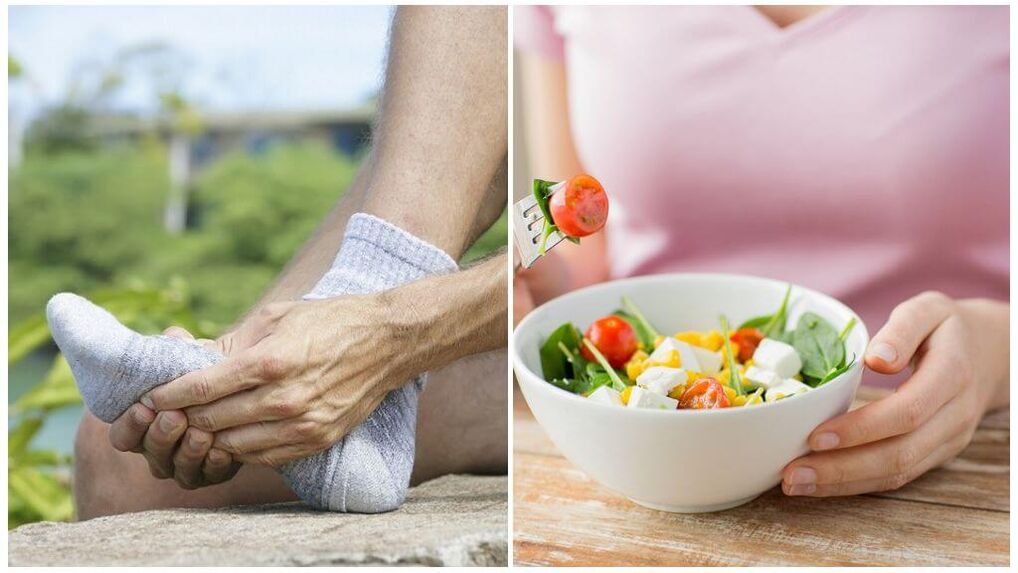
Important!
The drinking system should allow fluid to flow into the body in amounts of 2. 5 liters or more.
How to organize a meal
To maximize the effectiveness of your gout diet, you need to follow a few recommendations:
- the main method of cooking is cooking, baking, steaming;
- After boiling for 10 minutes, drain the broth;
- alternative meat, fish and vegetarian dishes;
- use only natural liquids;
- to spend fast days;
- avoid fasting.
Important!
In the presence of chronic diseases, a specialist should be consulted to develop an individual nutritional system.
The main types of diets
Organizing a proper therapeutic diet does not completely eliminate gout, but it significantly alleviates the manifestation of the pathology and prevents its recurrence. The type of diet prescribed depends greatly on the patient's general condition, weight, the presence of additional diseases, and even gender.
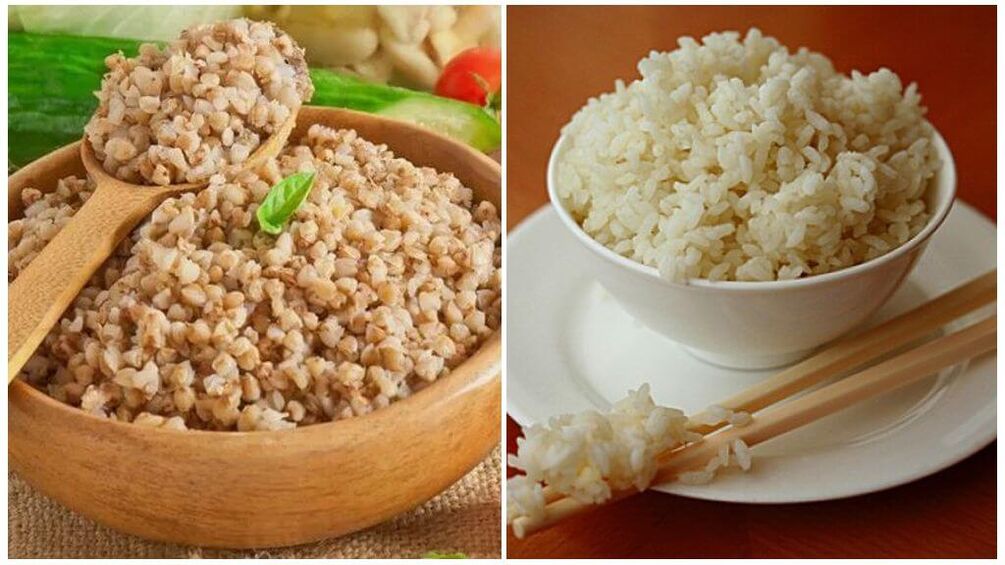
The main type of medical nutrition for gout is diet - Table 6. In addition, gout patients, especially those with shortness of breath and being overweight, often use diet table 8, the alkaline, rice, and buckwheat diets. A diet of kefir, cottage cheese, fruit or vegetables is perfect for fasting days.
Diet Table 6
It is prescribed primarily for patients with gout. It will allow the exchange of purine compounds to be normalized in a short time and the causes of crystallization and accumulation of uric acid salts to be eliminated.
Compliance with nutritional requirements reduces the activity of uric acid reactions in the body. As a result, the patient's well-being improves rapidly, the inflammatory process stops growing, swelling decreases, and joint pain and stiffness disappear.
Diet for high uric acid
It is based on the rejection or reduction of the menu of products with a high purine, refractory fat and salt index.
It is recommended to replace them with products with an alkalizing effect: dairy products, sour milk, cottage cheese, fruits and vegetables. The diet prescribes one day of fasting per week.
Diet to worsen gout
First, the amount of fluid consumed during exacerbation should be increased to 3 liters. Then completely exclude meaty and fishy foods. The lack of animal protein can be made up by increasing the proportion of milk and dairy products in the diet.
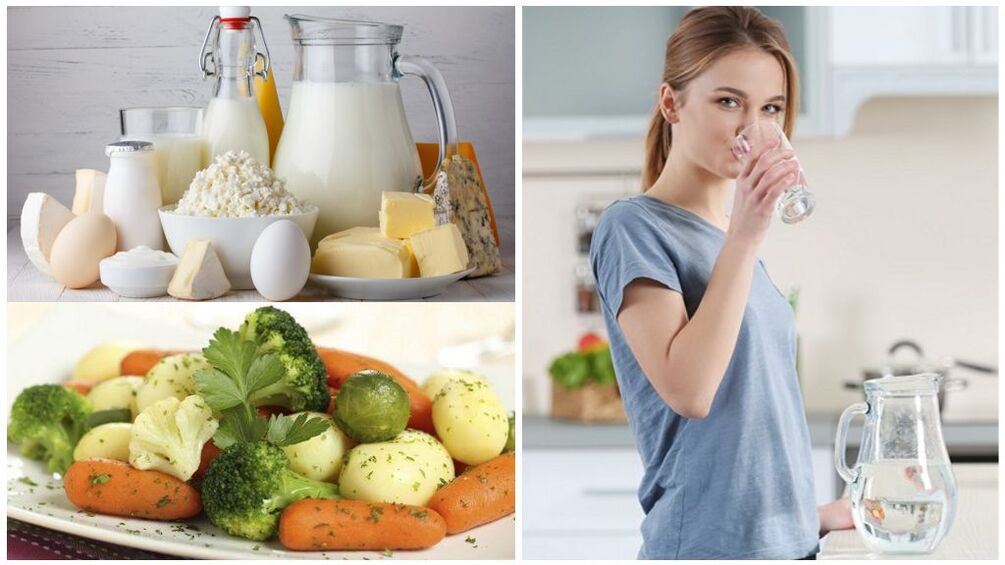
Before the end of the acute period of the disease, fasting days should be observed every other day, consuming a type of food (cottage cheese, kefir, cooked vegetables, fruits).
Important!
Fasting causes a sharp release of uric acid and is strictly prohibited in gout.
Diet Table 8
Table 8 strictly regulates the nutrition of gouty legs in large overweight patients. The purpose of this diet is to boost your metabolism and get rid of excess fat in your body.
The main difference from the general requirements of a therapeutic diet for gout in this case is a moderate reduction in caloric content and intake of drinking fluid, an average of 1. 5 liters per day.
In one comment!
For gouty men, the diet ensures that the caloric content of the food is not lower than 2100-2500 units. For women with gout, diet 8 limits the menu to between 1, 400 and 1, 700 kcal.
Buckwheat diet
The low calorie content of buckwheat allows it to be used in a therapeutic diet. Consuming it restores disrupted metabolic processes, quickly gives you a feeling of fullness, and allows you to forget about hunger for a long time. Buckwheat is a leader in the presence of vitamins and all types of trace elements.
Vegetable grain protein is better absorbed and can completely replace the animal. During the recovery phase of bone and muscle tissue, the product helps in the regeneration process. Buckwheat porridge combined with kefir is ideal for the day of fasting gout.
In one comment!
Buckwheat is more often made with dietary foods without salt. The buckwheat diet allows for rapid weight loss, which has a positive effect on the joints that are prone to the devastating effects of gout.
rice diet
The rice-based diet is most commonly used to cleanse the body and promote weight loss. Gouty rice speeds up metabolism, removes excess water and salt, and relieves swelling. Manganese, selenium, phosphorus, iron and zinc, which are part of rice, have a beneficial effect on all the body’s life support systems.
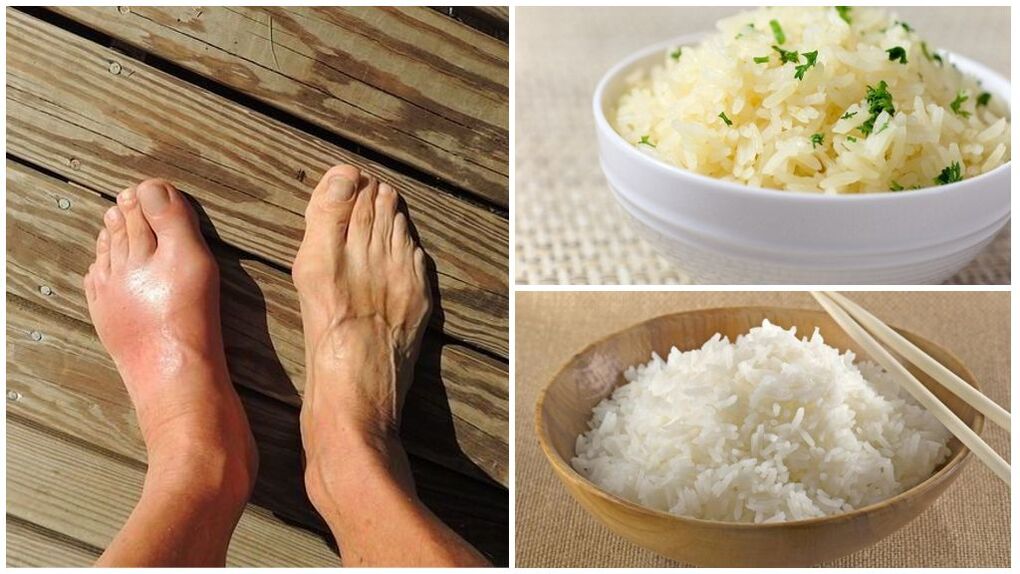
The porous structure of cereals removes accumulated harmful toxins, salts and slag from diseased joints. The rice diet can also be used on fasting days, especially when gout worsens.
Important!
Only brown or white long grain steamed rice is used for the diet. When treating gout with diet, these cereals can be used daily.
alkaline diet
Increased acidity of the body negatively affects metabolic processes. This is accompanied by a lack of calcium and the destruction of bone tissue. Applying an alkaline diet will help prevent health-threatening processes. The diet is based on fruit, sour milk and dairy products. This diet can be used both during the exacerbation of gout and during the remission phase.
Prohibited and authorized products
To properly rebuild your nutritional system, you need to know which foods are beneficial and help fight gout, and which ones are harmful and aggravate the disease.
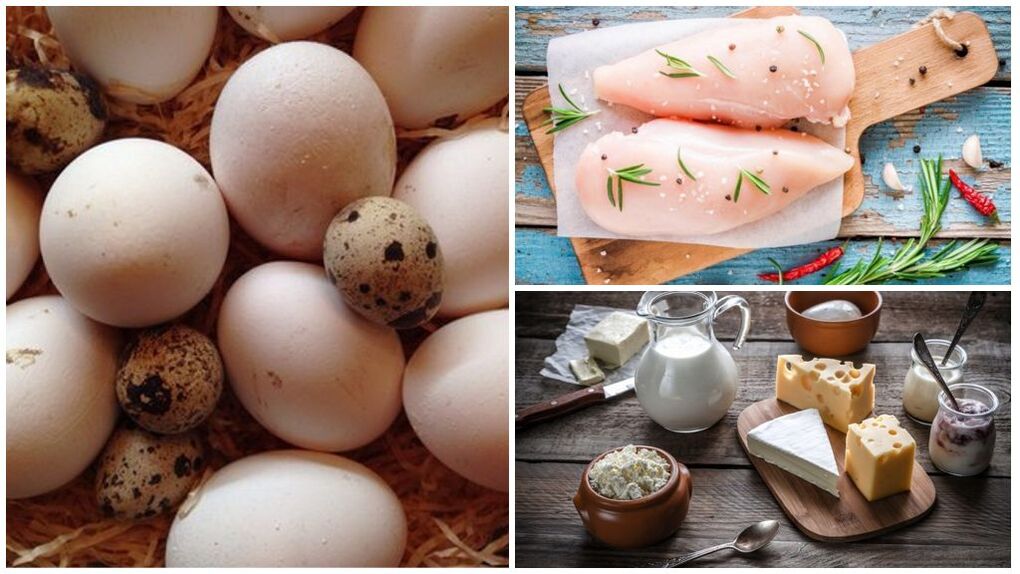
Depending on the amount of purines, salt, fat and other harmful substances, all foods can be listed in the table of essential elements of a gout diet. The main sign of the division of the list of gouty products is the content of purine compounds.
| With high purine content | Low purine |
|---|---|
|
|
Important!
It is strictly forbidden to drink gouty alcoholic beverages.
What products are useful
By determining the levels of purines and unhealthy fats in foods, you can find out exactly which foods can be eaten without gout without compromising your health.
In one comment!
Fruits that are particularly useful in the treatment of gout include pears, bananas and apples. Malic acid, which is part of the fruit, is able to neutralize the effects of uric acid.
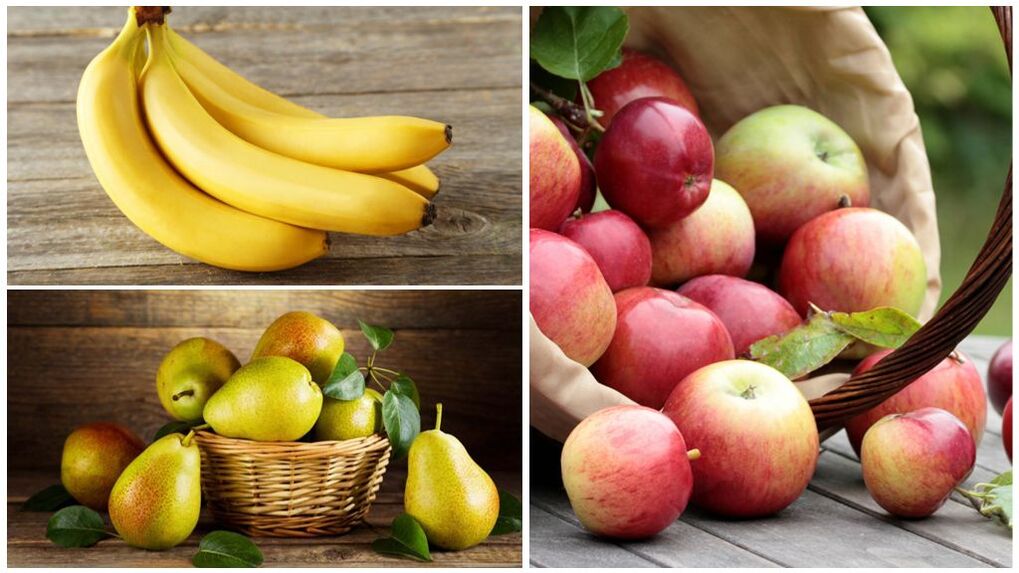
Potassium destroys uric acid crystals, which contributes to its accelerated removal from the body. Ascorbic acid heals, restores and strengthens connective tissues. The nutrition of fruits in the composition of fermented dairy products is particularly useful.
With gout, there are great benefits to using fresh cherries and cherry compotes on a regular basis. The berries contain antioxidants that work against free radicals. Bioflavonoids and anthocyanins prevent the inflammatory process in gout.
The beneficial substances found in strawberries and strawberries neutralize uric acid and prevent it from crystallizing in the joints.
In one comment!
You can include unlimited amounts of these berries and fruits in your gout diet.
What foods can not be eaten
In addition to the products listed in the summary table, strong meat, fish and mushroom juices should be excluded from the diet. They are contraindicated due to their high purine content, which can cause a sharp worsening of gout. Undesirable and fish, canned meat, contains a high percentage of salt. Their use with a purine diet upsets the water-salt balance and contributes to the further deposition of salts in the tissues of the joints.
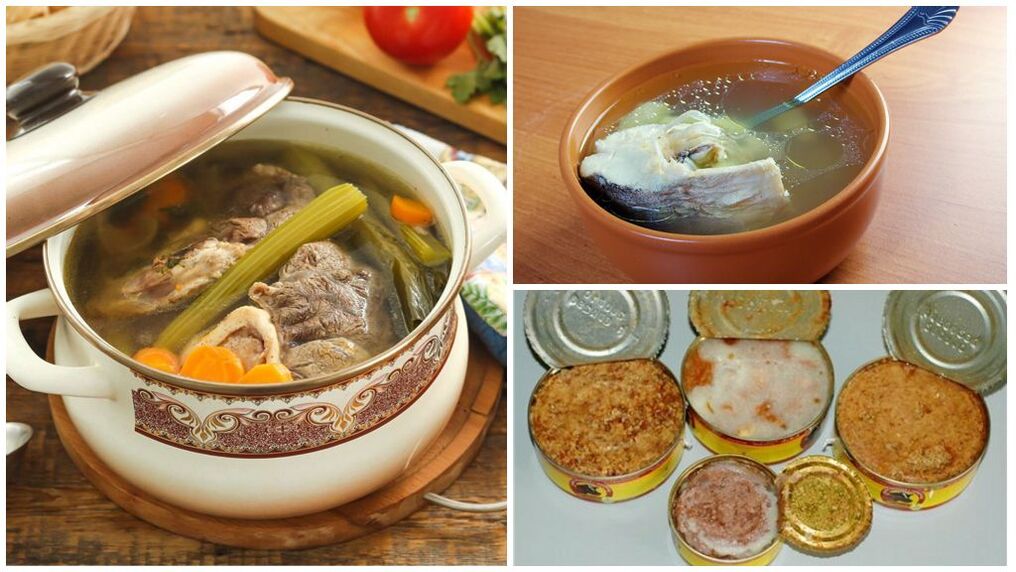
Tea, coffee and cocoa are also on the list of foods banned against gout. These drinks should not be drunk in case of gout as they retain uric acid in the body, disrupting the extraction process. This leads to a relapse of the disease.
Daily menu of the week
The wide list of products allowed for consumption allows food selection and proper eating for all gout patients. The recommended diet for the week is a balanced, complete, and useful meal for gout.
| Breakfast 1 | Omelette with herbs, rosehip soup and carrot salad |
| Breakfast 2 | Banana, kefir |
| Dinner | Vegetable soup with vermicelli, boiled potatoes, rabbit onion sauce, apple juice |
| afternoon tea | Apple, cheesecake, lemon tea |
| Dinner | Zucchini caviar with kissel |
| Breakfast 1 | Rice, pear soup, tomato salad |
| Breakfast 2 | Fruit salad with kissel |
| Dinner | Onion soup, barley porridge with wild mushrooms, dried fruit compote |
| afternoon tea | Fried pears and pumpkins |
| Dinner | Cottage cheese souffle, linden tea |
| Breakfast 1 | Wheat porridge, apricot juice |
| Breakfast 2 | Yogurt with cherries, rosehip broth |
| Dinner | Soup with fishballs, vegetable stew and apple jelly |
| afternoon tea | Cheesecake with sour cream and compote |
| Dinner | Pilaf with prunes and kefir |
| Breakfast 1 | Casserole with rice, smoothie and apple cabbage salad |
| Breakfast 2 | Strawberry cream with green tea |
| Dinner | Beetroot with sour cream, buckwheat, turkey breast with prunes and mint tea |
| afternoon tea | Pancakes with strawberries and carrots |
| Dinner | Cheese casserole with herbs and pear compote |

| Breakfast 1 | Oatmeal with raisins, tomato juice and fruit salad |
| Breakfast 2 | Cucumber salad with olive oil and orange juice |
| Dinner | Buckwheat soup with fried zucchini and orange juice |
| afternoon tea | Banana, oatmeal jelly |
| Dinner | Stewed fish with vegetables, kefir |
| Breakfast 1 | Millet porridge, plum juice |
| Breakfast 2 | Salad with young carrots and garlic, plus an apple |
| Dinner | Egg soup, cabbage rolls with vegetables and turkey, apple juice |
| afternoon tea | Cottage cheese with banana and strawberry tea |
| Dinner | Rice pudding, tomato juice |
| 1st breakfast | Poached egg, green tea |
| 2nd breakfast | Pears, green tea with marshmallows |
| Dinner | Borsch without meat, macaroni and cheese, fruit compote |
| afternoon tea | Baked apples with cottage cheese, lemon drink |
| Dinner | Vinaigrette, lime decoction |
An unlimited amount of permitted vegetables and fruits can be consumed to supplement the main menu. It is better not to use wheat bread for gout patients, including big toe.
Important!
Foods containing natural honey to treat gout can cause an allergic reaction.
Diet recipes
The weekly recommended sample menu includes a number of dietary foods to suit your meal. If desired, they can be exchanged with others based on the list and recommendations in the table of foods allowed to treat gout, what can and cannot be eaten in the case of gout.
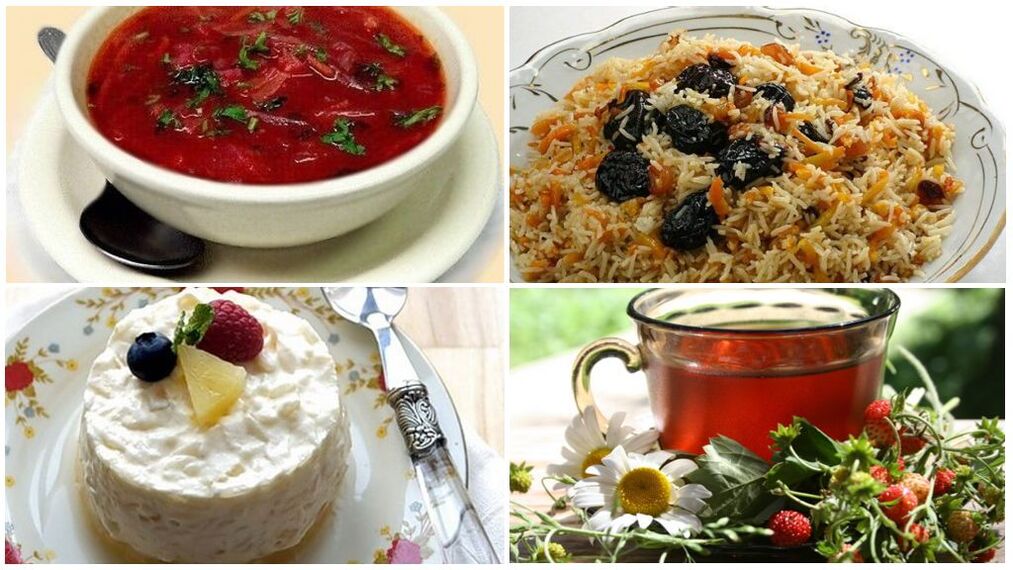
Borsch without meat
Peel 1 beetroot, carrot, onion. Stir in the diced onions and grated root vegetables on a coarse grater, adding a tomato or 1 tablespoon. l. tomato. Cut 4 potatoes into cubes and cook in 1. 5 liters of water. for 10 minutes. add fresh cabbage chopped into strips until cooked through. 5 minutes. - vegetables stew. Season with salt to taste. When serving, add parsley, dill and a spoonful of sour cream.
Pilaf with prunes
Rinse with a glass of rice. In a vegetable oil pan, add 2 onions cut into strips and 2 carrots cut into cubes. Simmer a little. Add 10 washed and chopped prunes. We pass everything until the vegetables are soft. Pour the rice, mix until completely saturated with oil, pour 2 cups boiling water. Add spices and salt to a minimum. After boiling, reduce the heat and cook under a lid for 20 minutes.
rice pudding
Boil half a cup of rice in 1 liter. water for 10 minutes. Drain the water, rinse the rice. Pour in a glass of milk and cook for another 25 minutes. until you get a soft porridge. Beat 2 eggs and simmer 50 g of raisins. Mix everything with the chilled porridge, add salt on the tip of a knife and 1 tsp. The Sahara. Bake in a baking dish on a medium flame until golden brown. Serve with cherry syrup.
strawberry tea
Pour a pinch of dry leaves with strawberries in a glass of boiling water, soak for 3 minutes. Drink without sugar.
With these everyday recipes, you can improve your well-being and reduce the manifestations of the pathology.
Conclusion
Proper nutrition of gout should become the daily norm in the patient’s life. This slows down or even stops the development of the pathology. As a result, other organs can be protected from damage.
Important!
It should be recalled that diet is a supplement, not a substitute for drug therapy. The recommendations of the rheumatologist should be followed at all stages of treatment.

















































































